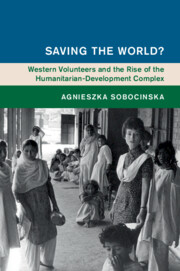Book contents
- Saving the World?
- Global and International History
- Saving the World?
- Copyright page
- Contents
- Figures
- Acknowledgments
- Abbreviations
- Introduction Western Volunteers and the Rise of the Humanitarian-Development Complex
- Part I Intentions
- Part II Images
- Part III Experiences
- 7 A Little Colony
- 8 The Intimacy of the Humanitarian-Development Complex
- 9 Resistance
- 10 To Hell with Good Intentions
- Bibliography
- Index
8 - The Intimacy of the Humanitarian-Development Complex
from Part III - Experiences
Published online by Cambridge University Press: 11 June 2021
- Saving the World?
- Global and International History
- Saving the World?
- Copyright page
- Contents
- Figures
- Acknowledgments
- Abbreviations
- Introduction Western Volunteers and the Rise of the Humanitarian-Development Complex
- Part I Intentions
- Part II Images
- Part III Experiences
- 7 A Little Colony
- 8 The Intimacy of the Humanitarian-Development Complex
- 9 Resistance
- 10 To Hell with Good Intentions
- Bibliography
- Index
Summary
In 1957, Joan Minogue, freshly graduated from a teaching college in regional New South Wales, arrived in Semarang in Central Java. She was there for eighteen months, teaching English under Australia’s Volunteer Graduate Scheme. Far from her parents and eager to further the Volunteer Graduate Scheme mission of “identification” with Indonesians, Minogue met and fell in love with Hardjono, a Javanese man living in nearby Bandung. After a slow start complicated by religious differences, declarations were made and the couple decided to marry. Minogue reapplied for another term with the Volunteer Graduate Scheme, which was delighted to have her back, but her application was rejected following a routine security check by the Australian government’s Department of External Affairs. Upon application, the Minister, Richard Casey, explained that Minogue was rejected because “you had declared your intention of getting married on your return to Indonesia.”1 For the Australian government, volunteering to help Indonesia’s development was one thing, but forging an intimate relationship across boundaries of nation, culture and race was quite another.
- Type
- Chapter
- Information
- Saving the World?Western Volunteers and the Rise of the Humanitarian-Development Complex, pp. 200 - 224Publisher: Cambridge University PressPrint publication year: 2021



